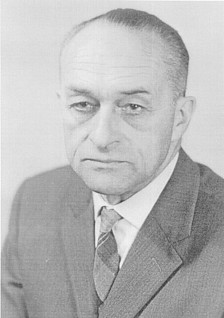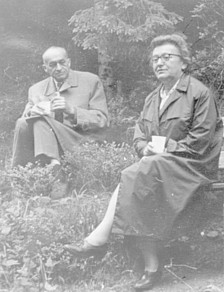History
The study of Agricultural Extension has had no academic tradition in the German speaking countries. Contrary to the USA, Agricultural Extension was not treated as a separate area of study. The peculiarity of Hohenheim was a result of "post-war history". Due to the suggestion from the American troops of the Stuttgart area during the occupation time, a new and active extension service (The Central Service for Education and Progress in Agriculture) was formed. This service cooperated closely with the existing Agricultural University Hohenheim while also allowing farmers to participate in deciding the working priorities. With the re-introduction of the independent state government, the question arose whether the “Central Service” should continue existing parallel to an advisory service of the state ministry, today’s official advisory service. The decision was made against the “Central Service”. The relatively strong, practically orientated Agricultural University considered this as a loss, and therefore decided to gain the head of the Central Service, Dr. habil. Hans Rheinwald, as professor. In 1950, the Institute for Agricultural Extension was founded with one professor and four scientific co-workers.
In 1970, the last staff car, an old VW Beatle from the Agricultural Central Service’s inheritence, was de-registered. Until about 1970, Reinhart Hillger was the last assistant, who still drove to Eppingen to editorial conferences. The “Warehouse Gazette” survived this retirement well. Good advice should make itself redundant; however, the plan to discontinue its publication failed in the face of protest from satisfied customers, the farmers.
Developments during the period 1950-1969
The discipline of extension did not yet have a theoretical foundation; however, at the same time there were urgent problems to be solved. Rheinwald therefore started with implementing the US American experiences, as far as possible, combined with comprehensive review activities for the OECD (Organisation for Economic Cooperation and Development). Most (west) European countries went to great lengths to establish an agricultural extension service after the war. With his relevant German extension experience Rheinwald together with Preuschen wrote the textbook “Agricultural Extension”, Bonn, 1956.
Rheinwald was early to highlight the inseparable interdependence between the farm and the household of family-held agricultural enterprises. This gave him strong impetus to develop the study course “Household Economics” at Hohenheim.
Due to an increased focus on the further development of farm business planning methods from the German agricultural economics institutes, the institute could dedicate itself more to the elementary methodological questions of extension. This research included the history of agricultural extension (“Extension Circles”), the organisation of extension (Denmark, The Netherlands and England), extension methods (pig feeding, demonstration farms), farmer decision behaviour (machinery purchasing, credit use, book-keeping), the influence of management qualification on profitability, intellectual investment in Agriculture and finally, the postdoctoral research of Erna Hruschka on the theme of psychological fundamentals of the extension process (1969).
Prof. Dr. Hans Rheinwald
Institute of Agricultural Counseling
Born on 17.01.1903 in Stuttgart, Hans Rheinwald completed his doctorate with Ms Prof. v. Wrangell at the institute for plant nutrition. With his work at the Prussian Agricultural Trial and Research Institute in Landsberg/Warthe, in the area of Agricultural Chemistry, Rheinwald had early ambitions to make scientific research rapidly available to farmers. He built up a fertilizer consultancy and was managing director of one of the earliest farmer-organised extension groups.
He passed away on 23.10.1968 shortly after retirement. As director of the Institute for Agricultural Extension (applied for by the senate in 1947 and founded on 1.10.1950) at the Agricultural University Hohenheim, the first institute of this kind in Germany, he started with clarifying the essence, objective and function of extension and scientifically elaborated the methodology of extension, before he advanced on to the social-psychological questions of extension from the 1960’s. This was significantly intensified by the collaboration with Erna Hruschka.
Developments from 1969 until 1990
Shortly after receiving his emeritus and retiring, Prof. Rheinwald died in 1969. Hartmut Albrecht was selected as his successor at the Institute of Communication Research and Agricultural Extension. Albrecht completed his post doctorate degree in Gottingen with his book about the innovation processes in agriculture. He was elected as dean shortly after starting as professor. These were turbulent times at the Universities. From the re-structuring of the faculties the Institute for Agricultural Sociology, Extension and Applied Psychology emerged from the former Institute of Agricultural Communication and Extension, and the Department for Agricultural Sociology of the Institute for Agricultural Politics (Professor Ulrich Planck). The independent Psychology department was under the leadership of Ms. Prof. Hruschka and originated from the previous Institute for Agricultural Extension.
The re-allocation of the department came at a turning point in agricultural politics (Mansholt-Plan, Hoecherl-Plan etc). Under increasing international competitive conditions “viable” farms should be developed, while those who had decided to exit agriculture, were to be given the support they required to make the change to other professions (Socio-Economic Extension). Now it showed that the governmental extension service had been working on the content questions (Production Technology, Labour Market, Markets, Business Management, etc.) almost exclusively for over two decades; methodological questions had practically been left untouched. In this situation, Hruschka and Albrecht gave the first methodological courses for many extension training institutes in the German speaking region and introduced this specialised field of work.
Due to the current situation, a special emphasis was placed on the area of socio-economic extension, later combined with working in the areas of organisation and management of extension, farm management behaviour, methods of adult training (especially targeting groups that were difficult to reach), technical communication, information behaviours of farmers, and of the methodological problems of nutrition, household and consumer extension.
Domestically, urgent research tasks arose mainly from the increasing difficulties in agriculture (farms at risk of bankruptcy), conflicts of interests between the business interests of farmers and environmental interests of the public, the search for “compatible” solutions and, concerning extension, the search for possibilities to retain the functionality of the governmental official extension even under difficult conditions (the multiplication of sovereignty and administration tasks with stagnant or diminishing capacity).
The governmental official service and the churches offered a special extension service for those businesses facing bankruptcy. The experience exchange among the advisors in the state of Baden-Wuerttemberg was initiated and accompanied by the department and this also led to a national collaboration.
Newly developed after 1975, was the area of research in developing countries. This came about partly from the demand of national and international institutions and partly from the development of the Tropenzentrum at University Hohenheim and the special research programme in West Africa. Tasks completed were related to the problems of situation analysis, communication (Egypt), organisation and methods (Iran, Turkey and Egypt), comparison of organisational history (Taiwan) and needs analysis for development planning (Iran). The demand in this area grows. This is also the case with inquiries from PhD candidates from Third World countries. In the setting of the partnership with the Agricultural University of Beijing (<st1:country-region w:st="on"><st1:place w:st="on">China</st1:place></st1:country-region>) extension research was initialised and an institute for extension established. There in the last years, the focus shifted to questions regarding intercultural communication, sharing of local expertise (indigenous knowledge), organisation and management, participation and self help, co-operation in knowledge systems (research, extension and user systems), function of extension in “farming systems research” and with the development of the location specific and socially equitable innovations.
With significant involvement from the department, in 1981 the German Organisation for Technical Cooperation (GTZ) published a two-volume handbook for the field of extension in the third world. In 1987/88 it was re-published as a re-edited second edition, also available in French and Chinese (volume 1) English and Spanish (both volumes). Former and present staff of the department were involved with conducting training seminars and workshops for German and foreign specialists with the DSE in Bad Honnef and Feldafing, with the LBL (now AGRIDEA) in Switzerland, with the Evangelic Academy Bad Boll and further co-operation partners.
Prof. Dr. Erna Hruschka
Department of Behaviour Research and Applied Psychology
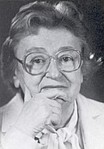 | In 1951, Erna Hruschka (born 18.12.1912) started as a technical assistant with Prof. Rheinwald. It was only later that she studied Psychology in Tubingen and then returned to the institute, where in 1959, she received her PhD. Her post doctorate research “Attempt of a Theoretical Basis on the Extension Process” was a milestone for the further work of the institute. Together with Hartmut Albrecht, she developed methodological courses for agricultural and household economics extension specialists from Italy, Switzerland, and Austria in the 1970’s. Her lectures left a lasting impression on the students. She was not only teaching in the classical sense, but also offered psychological advice to learning and real life problems. She followed M. von Wrangell as Hohenheim’s second female professor and when she retired in 1974, the psychology department was permanently established at Hohenheim. Erna Hruschka passed away on 24.03.1996. | 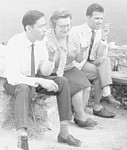 |
Developments between 1990 and 2000
With a specialist colloquium on “Extension for Farming Families facing Bankruptcy” and a celebration with friends, colleagues and students on 29.09.1990, Hartmut Albrecht decided to end his official duties as university professor. At this occasion, his staff presented the plan of a book ““Extension as Life Assistance” to him, which would be a compilation of the work of the Hohenheim Extension School. It was published in 1992. The position for “Agricultural Extension Professor” was advertised; however, a shortlist was not yet decided on, so Hartmut Albrecht agreed to take on the role for another semester.
Volker Hoffmann, a member of the department since 1973, completed his habilitation in Hohenheim for Social Sciences of Farming in 1990. He received offers from the Universities Hannover and Giessen and began working in Hannover in the department “Communication Science for Horticulture” on 01.04.1991.
In the summer semester of 1991, Dr. Hermann Boland from Giessen accepted the call to take on the leadership of thedepartment. At the end of the summer semester, he changed back to Giessen though. On 01.04.1992, Prof. Volker Hoffmann took over and was officially confirmed on 01.10.1992. He continued in the department in Hannover according to his teaching contract for another two semesters, until he could hand his responsibilities over to Prof. Dr. M. Giesecke at the end of the summer semester 1993.
On 19.12.1992, we invited everyone to a scientific colloquium and a social get-together to celebrate the 80th birthday of Prof. Dr. Erna Hruschka, whom the institute was especially grateful to. The event was very successful and received a great reception, although Erna Hruschka could not attend, as she had to go to hospital one day before. At this celebration, a book was presented as a project, which was published in 1994. Erna Hruschka died on 24 March 1996 in Porz, a suburb of Cologne.
In the institute as such, there was only one significant change; the department Psychology (Prof. Schuler) was allocated to the faculty V, the Institute of Social Science 540. Prof. Schuler stayed co-opted member of faculty of agriculture; the existing course offer remained unchanged despite the reorganisation. Since the institute still kept one psychologist, Prof. Diedrichsen from the department of Nutrition Psychology, the faculty shift of Mr. Schuler and his staff was generally accepted.
An important factor for the co-operation between the universities was the annual Meeting of University Lecturers for Communication and Extension in Rauischholzhausen, which started in 1993. A significant result of the meeting in 1994 was the decision to publish a co-operative series: Communication and Extension; Social Science Writings about Land Use and Agricultural Development, published by Hermann Boland, Volker Hoffmann and Uwe Jens Nagel by Margraf-Verlag, Weikersheim. Until today, 100 books have been published in this series.
The acceptance of various duties and functions may also have contributed to an increased visibility and perception of our work. Volker Hoffmann became a board member of the Tropenzentrum at the University Hohenheim, and was the first chairman of the internship committee of both Agricultural Faculties, he then became chairman of the examination committee. Outside the University, he first became a member of the Scientific Council of ATSAF (Concil for Agricultural Research in the Tropics and Sub-tropics), then chairman of the ATSAF and of the BEAF Council (Workgroup for Development-orientated Agricultural Research), member of the Board of Trustees at IITA (International Institute of Tropical Agriculture) in Ibadan, Nigeria, and advising scientist to the ISNAR (International Service for National Agricultural Research) in Den Haag, The Netherlands. Since 1994, he has been a member of the editorial committee of the journal “Education and Extension of AID”, as well as in the counsel of the Family Extension Service of the Evangelic Farmers Association in Hohenbuch. Between 1994 and 1998, Volker Hoffmann was a member of the Editorial Board of the „Journal of Extension Systems“, which is published in India, and since 1997, he is a member of the DLG (German Farmers Association) committee for International Partnerships.
1994 was the last year of the university partnership with the University of Beijing, China. Our Prof. Emeritus, Mr. Albrecht, had successfully developed the relationship. Two Chinese PhD students, the translation of our Extension handbook, the strengthening of the Agricultural Extension Institute at the University and a successful partnership with the CIAD-Centre in Beijing were all fruits of this co-operation. Furthermore, we work on projects together with the East Europe Centre of the University Hohenheim, are involved in the Tempus/Tacis projects with Romania and Russia and maintain close contact with former PhD students and co-workers, who continue to work as freelance trainers or experts in our area of expertise.
This phase also marks the beginning of our collaboration within the BMBF interdisciplinary project: Cultural Landscape Hohenlohe. Problems with the preservation of the cultural landscape caused by its land use would be the subject of an over five year long interdisciplinary research conducted by a large team. Prof. Dr. Werner Konold, from the University of Freiburg, is the spokesman, Volker Hoffmann one of the deputies and also the representative from the University Hohenheim. Alexander Gerber and Angelika Thomas are the two researchers from our department involved in the program, whose funding ended in March 2002.
Prof. Dr. Hartmut Albrecht
Field of Communication Research and Agricultural Extension
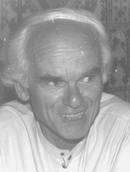 | Hartmut Albrecht was born on 02.08.1925. After the end of the war, 3 years practical work in agriculture and horticulture. Agricultural studies at University Hohenheim (1948-51). Dissertation on Agricultural Extension in Denmark and the Netherlands. Advisor to the Board of Trustees for Technology in Agriculture (KTBL 3 ½ years). Assistant at the Institutes for International Agriculture in Berlin and Goettingen. Habilitation on innovation processes in agriculture. From 1969-90 professor at Hohenheim. In the new role as Emeritus in this field of study without a predecessor. In close cooperation with Erna Hruschka, he laid the basis for the Hohenheim Extension Science with a social science and humanistic foundation. He broadened the spectrum of research and teaching to include problems concerning developing countries and was involved in founding the study course for Communication Sciences as well as the German Agricultural Museum. He passed away on 6th of April 2005. | 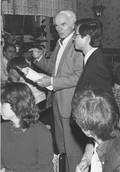 |
2000: The 50-year anniversary and the following years
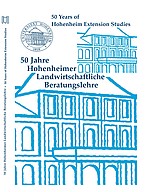 | On the 29.9.2000 we celebrated the 50th birthday of our Department with a festive congress. It was an occasion to look back at half a century of extension education. The contents are documented in a book. In 2001, the fully expanded and revised edition from Volker Hoffmanns „habilitation“-thesis was published in German, French and English. CTA in Wageningen supports the circulation of the foreign language editions of this book about “Picture Supported Communication in Africa”. At the end of 2002, the English edition went into a new edition. Also in 2001, the book, „Extension for farms facing bankruptcy“ was published and dedicated to Hartmut Albrecht on his 75th birthday. |
2002 was the year of awards: Kirsten Probst received the Hofbrau foundation dissertation award and Anja Christinck with Kirsten vom Brocke were awarded the Knoll-Prize from the Eiselen foundation for their interdisciplinary research and their dissertations.
In 2004, Christoph Reiber received the Ruthenberg award from the Eiselen Foundation. Simone Helmle received the Suedwest Bank Prize for her dissertation.
After being member of the management team in the Hohenlohe project, Alexander Gerber became the coordinator for ecological farming at the University of Hohenheim. He also managed one of our research projects related to education for ecological farming. Later he became the managing director of the Association of Ecological Food Business (Bund Ökologischer Lebensmittelwirtschaft BÖLW) in Berlin.
On the 6 April 2005, our emeritus, Prof. Dr. Hartmut Albrecht, passed away in Nuertingen at the age of 79.
In 2007, we published "The History of Agricultural Extension in Malawi"; also the extensive final report from the Hohenlohe project was finally released from oekom publishers as a two piece volume. Our methods handbook “Transdisciplinary Research” then followed in 2009 from the same publisher, also being based on the experience gained from the Hohenlohe project. And finally, in the same year we completed the third edition of our „Handbook Rural Extension”, at least volumes 1 and 2.
There were significant changes also in the whole institute. A new chair for Gender and Nutrition was created, firstly occupied by Ms. Prof. Dr. Eva Barlösius followed by Ms. Prof. Dr. Anne C. Bellows. In return, Prof. Dr. Dr. habil. Franz Kromka’s chair was discontinued when he retired in 2009.
At the end of 2009 Volker Hoffmann gave up the ATSAF (Council for Tropical and Subtropical Agricultural Research) chairmanship, which was then taken by Folkhard Asch. In summer 2010 Hoffmann became vice dean of studies and, in return, he handed on his functions in the examination and internship committees.


